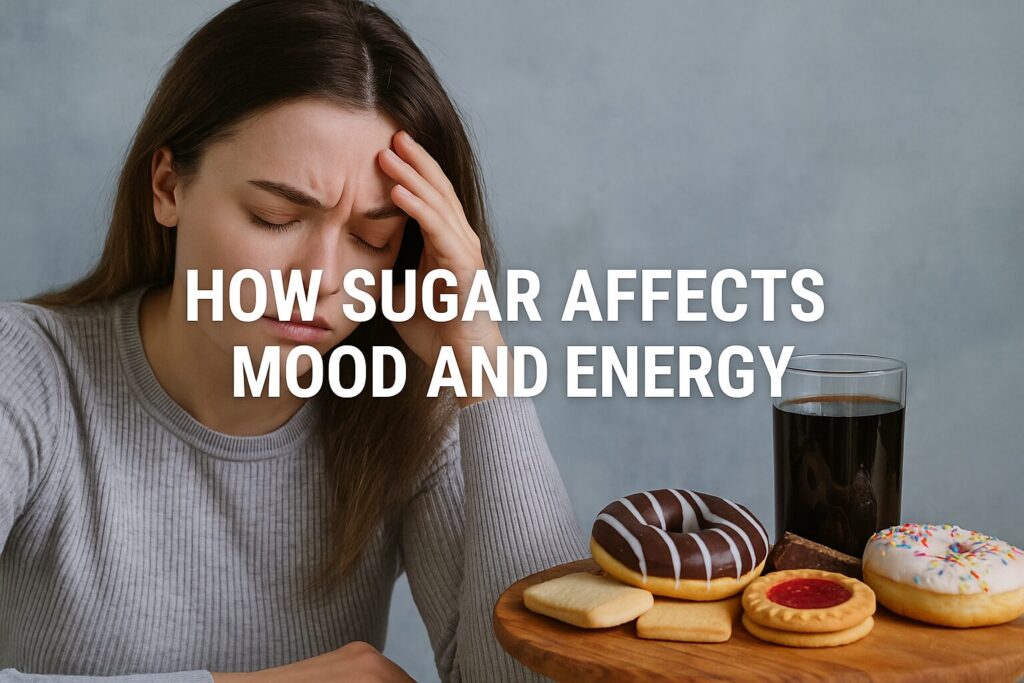Sugar is a staple in many diets around the world, often consumed without a second thought. But while it may provide a quick energy boost and momentary pleasure, excessive sugar intake can have a profound impact on your mood and energy levels. In this article, we explore how sugar affects mood and energy, offering insights into the physiological and psychological responses to sugar consumption.

Understanding Sugar and Its Types
Before diving into how sugar affects mood and energy, it’s essential to understand what sugar is. Sugar is a type of simple carbohydrate that the body converts into glucose, the primary energy source for our cells. There are different types of sugars:
Did Know This: Does Sugar Make You Tired?
- Natural sugars: Found in fruits (fructose), dairy products (lactose), and some vegetables.
- Added sugars: Sugars that are added to foods during processing, such as high fructose corn syrup, white sugar, and brown sugar.
Let’s know: Top 10 Foods For Blood Sugar Level Control
Both types impact the body, but added sugars are more likely to cause mood and energy disruptions.
The Immediate Impact of Sugar on Energy
When you consume sugar, especially in large amounts, your blood glucose levels spike rapidly. This surge gives you a quick burst of energy, often referred to as a “sugar high.” However, the body responds by releasing insulin, a hormone that helps cells absorb glucose. This reaction can cause blood sugar levels to plummet, leading to a “sugar crash.”
During a sugar crash, you may feel:
- Fatigue
- Irritability
- Difficulty concentrating
- Mood swings
This cycle of sugar highs and crashes can become a regular pattern if sugar is consumed frequently, disrupting your natural energy balance.
It may help you kindly read: Foods That Help Lower Blood Pressure: The Ultimate Guide to a Heart-Healthy Diet
Sugar and Brain Chemistry
How sugar affects mood and energy is deeply linked to brain chemistry. When you eat sugar, your brain releases dopamine, a neurotransmitter associated with pleasure and reward. This reaction makes you feel good temporarily, which can lead to habitual sugar consumption.
Over time, the brain may become less sensitive to dopamine, requiring more sugar to achieve the same feeling. This can contribute to emotional dependency on sugar and a negative impact on mood stability.
Chronic Sugar Intake and Mental Health
Numerous studies have shown a correlation between high sugar consumption and poor mental health. People who consume excessive sugar are more likely to experience symptoms of:
- Depression
- Anxiety
- Stress
The inflammation caused by a high-sugar diet may also affect brain health and neurotransmitter function. Inflammation can interfere with the production of serotonin, another neurotransmitter that regulates mood.
Long-Term Energy Drain
One of the critical points in understanding how sugar affects mood and energy is realizing its long-term consequences. While sugar may offer immediate gratification, it depletes your energy reserves over time. Constant blood sugar fluctuations exhaust the adrenal glands, responsible for producing stress hormones like cortisol.
When these glands are overworked, it can lead to chronic fatigue and decreased stress tolerance. Additionally, poor sleep quality associated with high sugar intake can further drain your energy.
How to Stabilize Mood and Energy
To counteract the negative effects of sugar, consider the following tips:
Did you know about: Low Glycemic Foods for Mood Stability?
- Eat balanced meals: Include protein, fiber, and healthy fats in each meal to slow glucose absorption.
- Choose complex carbohydrates: Whole grains, legumes, and vegetables provide sustained energy without spikes.
- Stay hydrated: Dehydration can mimic fatigue and mood disturbances.
- Read labels: Watch for hidden sugars in processed foods.
- Limit sugary drinks: Opt for water, herbal teas, or naturally flavored beverages.
By making these changes, you can help regulate how sugar affects mood and energy in your daily life.
Natural Alternatives to Added Sugar
Replacing refined sugar with natural alternatives can help maintain stable energy levels and better mood. Some options include:
- Honey (in moderation)
- Maple syrup
- Stevia
- Monk fruit extract
These alternatives still contain sugar or sweetness, so moderation is key. The goal is to reduce dependency on high-glycemic, processed sugars.
The Role of Exercise and Lifestyle
Regular physical activity can mitigate the impact of sugar on your body. Exercise improves insulin sensitivity, helps stabilize blood glucose levels, and releases endorphins that enhance mood.
Also, mindfulness practices such as meditation and proper sleep hygiene can improve overall well-being, making you less reliant on sugar for emotional comfort.
FAQs: How Sugar Affects Mood and Energy
Q1: Can sugar really cause mood swings?
Yes. Sugar spikes and subsequent crashes can lead to irritability, anxiety, and mood swings.
Q2: How quickly does sugar affect energy levels?
Sugar can provide an almost immediate boost, but the crash usually follows within 1-2 hours.
Q3: Is natural sugar better than added sugar?
Natural sugars come with fiber and nutrients, which help regulate absorption and minimize crashes.
Q4: How can I reduce sugar cravings?
Eat balanced meals, get enough sleep, manage stress, and use natural sweeteners in moderation.
Q5: Can quitting sugar improve my mood?
Yes. Many people report feeling more emotionally stable and energetic after reducing sugar intake.
Final Thoughts
Understanding how sugar affects mood and energy is essential for anyone looking to improve their overall health. While sugar isn’t inherently bad, its overconsumption can have serious consequences on emotional and physical well-being. By making mindful dietary and lifestyle changes, you can break free from the rollercoaster of sugar highs and crashes, leading to a more stable and vibrant life.





Pingback: Does Sugar Make You Tired? The Surprising Truth About Sugar and Energy - fithut.in
Pingback: Low Glycemic Foods for Mood Stability: A Comprehensive Guide - fithut.in
Pingback: Top 10 Foods for Blood Sugar Control - fithut.in
Pingback: How Much Does Invisalign Cost In USA Cities (2025) | Cheapest to Costliest